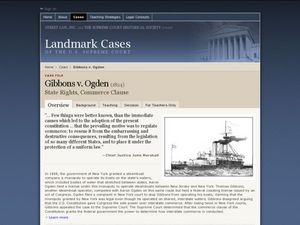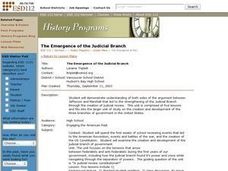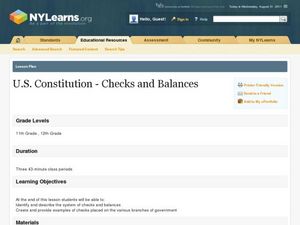Curated OER
Lesson 2: The Tired King
Middle schoolers are introduced to the three functions of government (legislative, judicial, and executive). They read and discuss a story about an overworked king who must handle all the tasks of government. Students give a description...
Curated OER
With Liberty and Justice for All
High schoolers examine the role of Supreme Court justices. In this judicial branch lesson, students consider the civil rights and civil liberties as they investigate Minersville School District v. Gobitis (1940) and West Virginia State...
Curated OER
How the Supreme Court Affects the Lives of Teens
Students describe the structure and function of the United States Supreme Court. They examine and analyze decisions made by the Court. They participate in a debate about recent issues.
Curated OER
Gibbons v. Ogden (1824)
Students examine state rights and the commerce clause. For this Supreme Court lesson, students examine primary documents from Gibbons v. Ogden and discuss the implications of the decision.
Curated OER
Utah's Judicial Branch
Seventh graders explain that the judicial branch of Utah's government interprets laws and reviews the consitutionality of laws.
Curated OER
Functions of the Three Branches of Government
Learners research the branches of government and write summaries about both the state and federal systems. After conducting reaserch in texts and online, students create Venn diagrams displaying the governmental functions of the three...
Curated OER
The Emergence of the Judicial Branch
Learners demonstrate understanding of both sides of the argument between Jefferson and Marshall that led to the strengthening of the Judicial Branch through the creation of judicial review.
Curated OER
The Legislative Branch
Students identify and describe the key terms as they relate to the Legislative Branch. Students describe how members of Congress are selected, how laws are created, and two of the limits on powers of Congress.
Curated OER
The Role of the Judiciary in a System of Separation of Powers and Checks and Balances
High schoolers determine the role of each branch of government in a system of checks and balances. They demonstrate the role of the judiciary in American government
Curated OER
Lesson 2: The Constitution: Our Guiding Document
Explore the structure and content of the US Constitution in the second lesson of this five-part social studies series. A collection of activities, games, and videos complement a class reading of a document summarizing the US...
Curated OER
Woodrow The White House Mouse
Inauguration Day is January 20. Implement an entire week's worth of mini activities to help young historians become knowledgeable of the President's job, the executive branch, and the White House. The worksheets focus on research skills,...
Curated OER
U S Constitution--Checks and Balances
Students get an in-depth look at how our checks and balances system helps maintain the separating of powers between the three branches of government. They use current event head lines and insert them into he appropriate space on the...
Curated OER
The Role of the Judiciary in a System of Separation of Powers and Checks and Balances
Students determine the difference between the different branches of government and assess the role of each within the American governmental system.
C-SPAN
Choice Board: Expressed and Implied Powers
Article 1, Section 8 of the United States Constitution expressly lists powers given to Congress. Over the years, lawmakers have expanded the enumerated powers to include powers implied by the list. To better understand the significance...
C-SPAN
How A Bill Becomes A Law
Seven steps are required for a bill to become a United States law. The Families First Coronavirus Response Act (H.R. 6201) is used as a model for the process of how a bill becomes a law. Class members work independently through a Google...
Curated OER
Lincoln's Spot Resolutions
Learners take a closer look at historical relations between the United States and Mexico. In this Texas annexation lesson, students examine primary documents authored by Zachary Taylor, James Polk, and Abraham Lincoln to consider why the...
Curated OER
U.S. Constitution and Amendments
Students explore the framework of government and examine the Constitution to see its impact on their lives.
Curated OER
Indiana Courts: How Do They Work?
Students identify the branches of Indiana's judicial system and determine the differences between the different courts and different types of cases. Students create a flow chart showing how a court case works its way through the legal...
Judicial Learning Center
Law and the Rule of Law
We hear a lot about the importance of the rule of law, but most people do not really know what those words mean. The lesson is a webpage that defines the rule of law, explains why it is important in a democratic society and provides...
Judicial Learning Center
The Judge and the Jury
Unless you are a lawyer, you might not understand just how unrealistic Law and Order and other legal dramas actually are. Here's a great resource to help scholars of criminology gain a more realistic perspective. The lesson outlines the...
Judicial Learning Center
Separation of Powers/Qualifications of Office
Time to work together in class to understand the separation of powers as well as the qualifications for office! The resource includes terms to review for pre-knowledge before beginning instruction. Following the review, pupils work on a...
Curated OER
Why Does Congress Work That Way?
Students discover the powers of Congress. In this legislative branch lesson, students examine the legislative process as they analyze Article I of the U.S. Constitution. Students consider the powers of Congress as they define the role of...
Curated OER
Political Parties and What They Do
The emerging politicians in your government might be familiar with the words "Democrat" and "Republican," but what do they really know about the role of political parties in America? Use this activity to reinforce information from your...
Heritage Foundation
Courts and Judges
If the Supreme Court is so supreme, why do all cases not just start there? High schoolers learn why every case does not start at the Supreme Court as well as the importance of hierarchy in the US judicial system in the 11th installment...

























